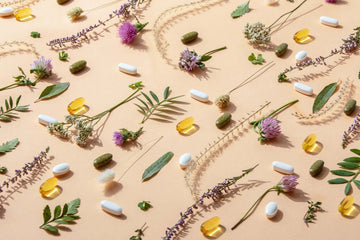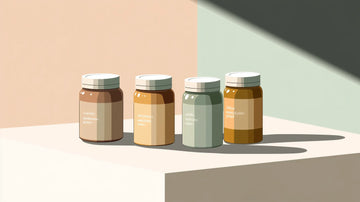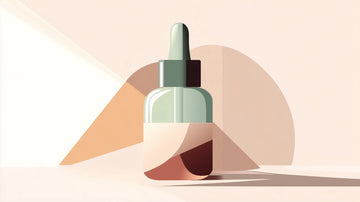After 40, your skin becomes more vulnerable to pollution. Why? Hormonal changes and natural aging weaken your skin’s barrier, making it more sensitive to external aggressors. The result: dehydration, accelerated wrinkles, a loss of radiance, and an uneven texture.
Key points to remember:
- Main pollutants : fine particles (PM2,5), nitrogen dioxide (NO₂), hydrocarbons (HAP).
- Effects on the skin: oxidative stress, collagen loss, weakened skin barrier.
- Solutions : antioxidants (vitamin C, E, Q10), anti-pollution routine (cleansing, hydration, sun protection).
Adopt the right care and simple actions to protect your skin, especially during menopause, when it is even more delicate.
Research on the Impact of Pollution on Skin Aging
The Negative Effects of Pollution on Your Skin
Recent studies show that air pollution triggers harmful reactions in the skin. Pollutant particles cause oxidative stress, disrupting the production of collagen and elastin—key elements for maintaining the skin’s elasticity and firmness. Here’s an overview of the main pollutants and their specific effects.
The Pollutants That Affect the Skin the Most
| Type of Pollutant | Effects on the Skin | Penetration Level |
|---|---|---|
| Fine particles (PM2.5) | They cause inflammation and oxidative stress | Very high |
| Nitrogen dioxide (NO₂) | It weakens the skin's protective barrier | Moderate |
| Hydrocarbons (HAP) | They reduce collagen production | High |
What Recent Studies Reveal
Scientific data confirm a direct link between daily exposure to urban pollution and accelerated skin aging. For example, prolonged exposure to fine particles is associated with faster wrinkle formation and a weakened skin barrier. These effects are particularly noticeable in women over 40, whose skin tends to be more sensitive due to hormonal changes.
Sensitivity to Pollution During Menopause
How Hormones Influence Skin Protection
When estrogen levels drop, it directly impacts three key mechanisms that help protect your skin:
| Consequences of Low Estrogen | Effects on the skin |
|---|---|
| Lower collagen production | Loss of firmness and elasticity |
| Weakened skin barrier | Greater sensitivity to external aggressions |
| Slowing Down Cellular Renewal | Extended recovery time after exposure |
These hormonal changes make your skin more sensitive and less resistant to pollution.
Interaction Between Hormones and Pollution
When skin, already weakened by hormonal fluctuations, is exposed to pollution, its natural defenses become even more compromised. The combined effects of menopause and pollutants can worsen skin damage. Here's what happens:
- Fine particles can more easily penetrate weakened skin, intensifying the damage.
- A slower repair process leads to an accumulation of damage and a less effective elimination of toxins.
To limit these effects, it’s essential to boost the skin’s defenses. Natural, hormone-free solutions designed to meet the specific needs of menopause can help protect your skin against these challenges.
Related YouTube Video
The Signs of Damage Caused by Pollution After 40 Years
Pollution can weaken the skin's barrier and disrupt cell renewal. These effects often become more noticeable on the skin after 40, thanks to structural changes and age-related challenges.
Visible Changes on the Skin
Here's how this damage might look:
- More sensitive skin to external aggressions
- Persistent redness and discomfort
- Loss of radiance, giving a dull complexion
- Irregular texture, with some rough patches
- Enhanced dehydration, making your skin drier
- Accelerated appearance of wrinkles, especially around the eyes and mouth
When Pollution and Age Combine
After 40, the effects of pollution mix with hormonal changes, making them even more noticeable:
- Skin sensitivity
- Loss of hydration
- The decrease in elasticity
- The slowing down of natural repair mechanisms
These signs show how important it is to protect your skin with the right care. A targeted routine can help strengthen your skin's barrier and keep it healthier in the face of everyday challenges.
How to Protect Your Skin from Pollution
After 40, and especially during menopause, your skin becomes more vulnerable to pollution. Here are some tips to keep it healthy and glowing.
Antioxidants to Include
Antioxidants are essential for protecting your skin. They are particularly well-suited for mature skin:
- Vitamin C: helps strengthen your skin’s barrier.
- Vitamin E: neutralizes free radicals.
- Coenzyme Q10: promotes cell renewal.
- Polyphenols offer protection against oxidative stress.
Incorporate these ingredients into your daily care routine to get the most out of them.
An Effective Anti-Pollution Routine
To protect your skin from pollution, try a simple yet targeted routine:
1. In the morning: apply a cream containing antioxidants and a sunscreen with an SPF of at least 30 before you head out.
2. During the day: use a mineral mist to keep your skin hydrated and protected, especially in an urban setting.
3. Evening: start with a double cleanse. Begin with an oil or cleansing balm, followed by a gentle cleansing gel or foam.
Daily Gestures to Protect Your Skin
In addition to treatments, your everyday habits can make a big difference:
- Stay hydrated: drink at least 1.5 liters of water per day.
- Adjust your diet: enjoy antioxidant-rich foods, like red fruits and green vegetables.
- Protect yourself physically: wear a hat or scarf during pollution peaks.
- Purify the indoor air: install an air purifier in your room to reduce exposure to pollutants.
During menopause, when the skin is more delicate, these simple actions help boost its balance and everyday vitality.
Conclusion: Protecting mature skin from pollution
After 40, your skin becomes more sensitive to the effects of pollution, especially since its natural defenses begin to weaken. Antioxidants play a key role by acting as a shield against external aggressors, particularly during menopause when your skin is even more delicate. This is why it's important to adopt suitable solutions.
To strengthen these natural defenses, it's essential to follow a regular skincare routine. Incorporate simple practices into your daily life: apply sunscreen every day, deeply moisturize your skin, and opt for a diet rich in antioxidants. These habits will help maintain the glow and health of your skin.






